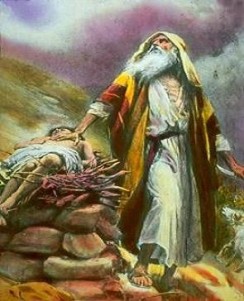Blog Archives
The Road to Moriah
God said to Abraham, “Take your son, your only son Isaac, whom you love, and go to the land of Moriah, and offer him there as a burnt offering on one of the mountains that I will show you” (Genesis 22:2).
The road to Moriah is a dark road. It’s dark because it means that Abraham has to give up what means the most to him, his only son, Isaac. There’s more to it than that, though. Isaac isn’t just Abraham’s son, he’s the fulfillment of the promise, “I have made you the ancestor of a multitude of nations” (Genesis 17:5).
Do you ever get to a place where God seems distant, remote, or even silent? What do you do? Abraham was in a place where God seemed to contradict himself. That He wants to remove the promise that He Himself gave Abraham all those years before.
You may know what it means to walk in darkness. Sometimes faith is walking in darkness and absolutely refusing to quit. Sometimes it is just hanging on. Faith that allows us to be transformed by darkness and suffering is not being doubt-free, it is a tenacious obedience.
As Abraham raises his hand to destroy his only son, his promise, he somehow believes. He is not perfect in his belief, he has never been perfect in his belief. He tried to help God out in His promise by impregnating Hagar. This is the irony of Abraham. His journey of faith is riddled with doubt.
Just before Abraham plunged the knife into his son, the son whom he loved with all his heart, the angel of the Lord called out to him twice. It’s as if the angel wants to make sure he hears before it’s too late, “Abraham, Abraham!”
Abraham answers, “Here I am.” The angel speaks, “Do not lay your hand on the boy or do anything to him” (Genesis 22:12). In that instant Abraham is given back his promise, and the Lord provided a ram for the sacrifice.
Abraham doesn’t see everything. He never saw the fulfillment of the promise. He just hangs on. Suffering by itself doesn’t produce perseverance, it’s only suffering that is endured in faith.
The Essence of Worship
 Worship is not simply something that happens on a Sunday morning as we stand among our fellow congregants and we feel the presence of the Lord. Worship also happens when we are in our darkest hour and we affirm his sovereignty no matter what our circumstance. It is not until we go through a situation like David‘s or Job’s that we can prove to ourselves that we are worshipers. It is in stressful situations that our true colors are revealed, and we discover if we are true worshipers or not. It is not until we worship in the hardest of times that we know what it means to be a true worshiper.
Worship is not simply something that happens on a Sunday morning as we stand among our fellow congregants and we feel the presence of the Lord. Worship also happens when we are in our darkest hour and we affirm his sovereignty no matter what our circumstance. It is not until we go through a situation like David‘s or Job’s that we can prove to ourselves that we are worshipers. It is in stressful situations that our true colors are revealed, and we discover if we are true worshipers or not. It is not until we worship in the hardest of times that we know what it means to be a true worshiper.
Worship is something that we learn. Psalm 89:15 tells us, “Blessed are those who have learned to acclaim You.” We are not born with this talent. It is not some gift that is possessed by a few. Worship is simply expressing oneself to God, and we must learn that expression and open our hearts to become conduits of the Holy Spirit.
Our ability to worship is learned through application. It is learned by experience. Just like our ability to pray effectively, it is learned by doing it.
Don’t become impatient if you’re not able to worship now as you desire. Learning the art of worship does not come easily and it is a lengthy process. The lessons that God allows to come our way may be dramatic (ie. Abraham, Job, or David). If we respond positively rather than wallowing in our circumstances, it will help us to grow as worshipers.
Psalm 42:7 states, “Deep calls to deep in the roar of your waterfalls.” The deep within us—the expression from the deepest part of our soul that affirms the sovereignty of God regardless of the trying circumstances we may face. Worship is the deep within us crying out to the deep in God.
Our desire to worship God is placed in us by God Himself. Worship is born in the heart of God. The Holy Spirit initiates worship in the heart of man and he is vitally involved in our worship.
